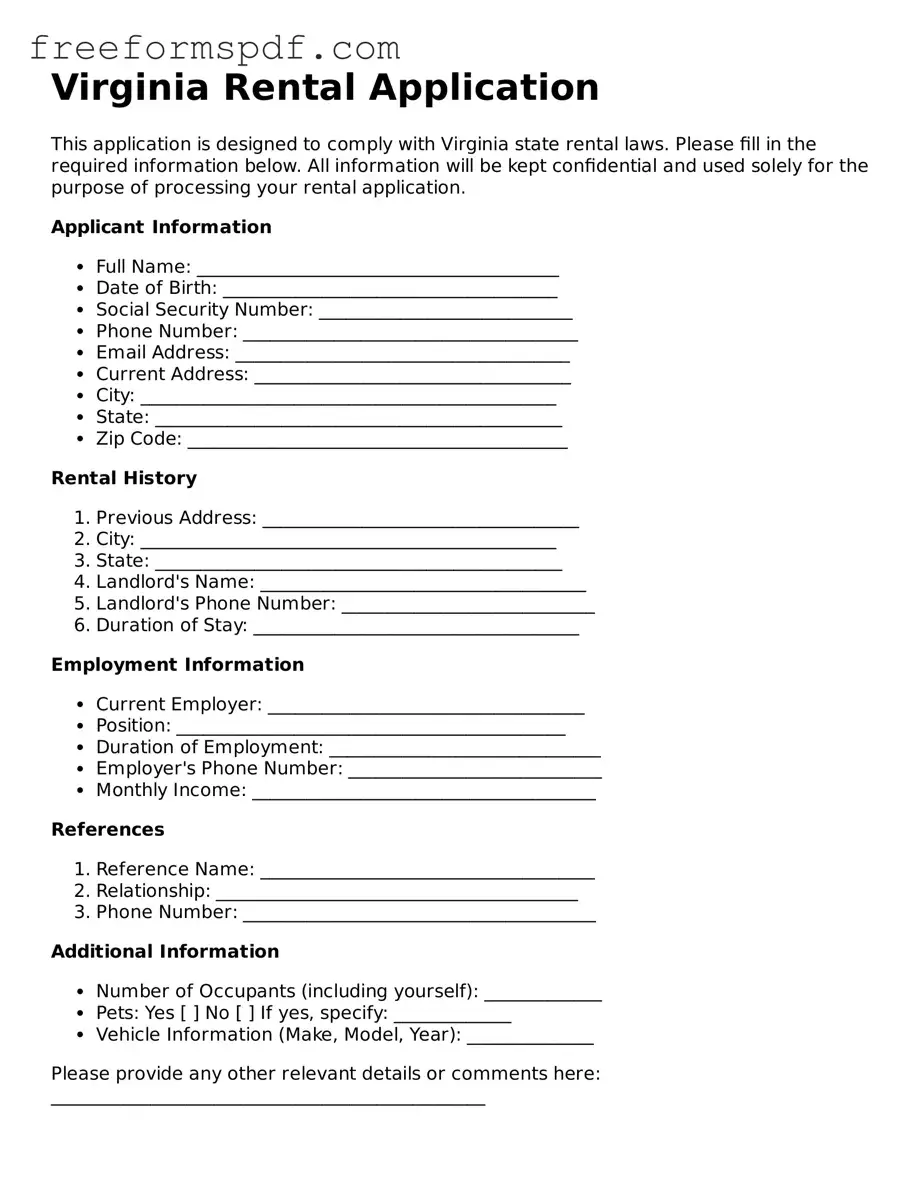Attorney-Verified Rental Application Document for Virginia State
Common mistakes
-
Incomplete Information: Many applicants fail to fill out all sections of the rental application. Missing details, such as employment history or references, can lead to delays or outright rejection.
-
Inaccurate Contact Information: Providing incorrect phone numbers or email addresses can hinder communication. Landlords may attempt to reach you for follow-up questions and may be unable to do so.
-
Neglecting to Sign: Some individuals forget to sign the application. A signature is often required to validate the information provided and to signify consent for background checks.
-
Omitting Financial Details: Applicants sometimes overlook including necessary financial information, such as income or credit history. This can create uncertainty for landlords regarding your ability to pay rent.
-
Ignoring Pet Policies: Failing to disclose pet ownership can lead to complications. If a rental property has specific pet policies, not mentioning your pets may result in penalties or eviction.
-
Rushing the Process: Taking the time to carefully review the application is crucial. Rushing can lead to errors or omissions that could jeopardize your chances of securing the rental.
Learn More on This Form
-
What is the Virginia Rental Application form?
The Virginia Rental Application form is a document that potential tenants fill out when applying to rent a property in Virginia. This form collects essential information about the applicant, such as personal details, rental history, employment information, and references.
-
Why do I need to fill out a rental application?
Landlords use the rental application to evaluate potential tenants. It helps them assess your background, financial stability, and suitability for the rental property. Completing this form is often a necessary step in securing a rental agreement.
-
What information is typically required on the application?
The application usually asks for:
- Your full name and contact information
- Social Security number
- Employment details and income
- Rental history, including previous addresses
- References from past landlords or employers
-
Is there a fee for submitting a rental application?
Many landlords charge an application fee to cover the costs of background checks and processing. This fee can vary, so it’s important to ask the landlord about the amount before submitting your application.
-
How long does it take to process a rental application?
Processing times can vary. Generally, it may take anywhere from a few hours to a few days. Factors influencing this include the landlord’s policies and the thoroughness of the background checks.
-
What happens if my application is denied?
If your application is denied, the landlord is required to inform you. They should provide a reason for the denial, which may relate to your credit history, rental history, or income verification. You have the right to ask for more details if needed.
-
Can I appeal a denial of my rental application?
Yes, you can appeal a denial. Contact the landlord or property manager to discuss your concerns. They may allow you to provide additional information or clarify any misunderstandings that led to the denial.
-
What should I do if I have a poor credit history?
If you have a poor credit history, consider explaining the circumstances in your application. Providing references or a co-signer can also help strengthen your application. Some landlords may be willing to work with you if you demonstrate stability in other areas.
-
Can I fill out the application online?
Many landlords now offer online rental applications. Check with the property manager or landlord to see if this option is available. Online applications can be more convenient and faster than paper forms.
Misconceptions
Understanding the Virginia Rental Application form can be challenging. Here are some common misconceptions that people often have:
- It's just a formality. Many believe that the application is merely a formality, but it is a critical step in the rental process. Landlords use it to assess potential tenants thoroughly.
- Only credit history matters. While credit history is important, landlords also consider rental history, income verification, and personal references when evaluating applicants.
- All applications are treated the same. Each application is unique. Factors like the applicant's background, rental history, and the specific property can influence the decision.
- Providing false information is harmless. Misrepresenting information can lead to immediate disqualification or future legal issues. Honesty is crucial.
- Application fees are optional. Many landlords require a non-refundable application fee to cover the costs of processing the application. This fee is typically mandatory.
- Once submitted, you cannot make changes. Applicants can often update their information if they notify the landlord before a decision is made.
- All landlords follow the same criteria. Different landlords have different criteria for approval. It's essential to understand the specific requirements of each rental.
- Submitting an application guarantees approval. Submission does not guarantee that a rental application will be approved. Approval depends on various factors, including competition from other applicants.
Being aware of these misconceptions can help applicants navigate the rental process more effectively.
Some Other Rental Application State Templates
Oregon Landlord Association - Provide certification of your ability to maintain the property well.
Free Rental Application Template - State if any of the applicants will require language assistance.
Tenant Application Form Template - Indicate your date of birth for identification purposes.
For those involved in vehicle sales, understanding the requirements surrounding the New York MV51 form is crucial, especially when dealing with vehicles that are 1972 or older. This form not only facilitates the legal transfer of ownership but also provides necessary documentation for private transactions. To assist in this process, resources like NY Templates can be invaluable, offering templates that help streamline the paperwork associated with vehicle transfers.
Rental Application Form Texas - Include information on pets, if applicable.
